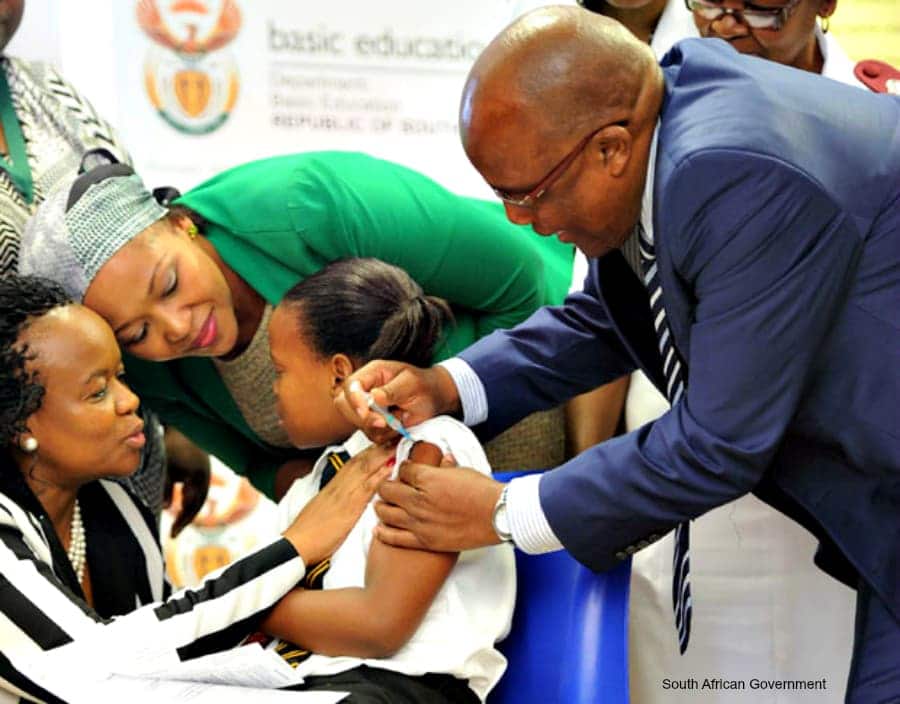Local experts wary of early cervical cancer jab successes


“The vaccine is completely changing the epidemiology [of cervical cancer] in our country,” said Dr Julia Brotherton, medical director for the Australian National HPV Vaccination Programme Register.
According to Brotherton, Australia began vaccinating girls against the human papillomavirus (HPV), which can cause cervical cancer, in 2007.
As these girls and successive generations of vaccinated young women have grown older, the country has seen a decline in potentially cancerous skin lesions among young women, she added.
“It is quite remarkable how quickly we are seeing reductions in the serious outcomes from this infection,” Brotherton said.
Local cervical cancer expert University of Cape Town’s Prof Lynette Denny cautioned that South Africa is unlikely see similar results.
“I do believe it will have a significant impact… but I think we are unlikely to see as dramatic an effect as was seen in Australia,” Denny told Health-e News. According to Denny, South Africa is unlikely to vaccinate as large a percentage of young women as Australia, which conducted “catch up” campaigns among women as old as 26 years old. She added that South Africa’s high burden of HIV, which makes one more susceptible to cervical cancer, may also have an impact.
South Africa introduced the HPV vaccine into its national programme last year. Girls received the second of two doses of the vaccine in November.
According Department of Health spokesperson Joe Maila, the department is in the process of analysing coverage data from the campaign’s second round of vaccinations.
At the recent World Cancer Congress, Senior Programme Officer for the global health non-profit PATH commended South Africa and a handful of other African countries for successfully rolling out the vaccine nationally.
“A lot of people thought it couldn’t be done, or at least not done well, but we’ve proved the naysayers wrong,” said LaMontagne, whose organisation assists countries with developing vaccination plans.
A pilot study conducted ahead of the national roll-out showed that the HPV vaccine was well accepted by communities and that high vaccination rates would be possible. The study, published in the current issue of the South African Medical Journal, enrolled 2 030 Gauteng and Western Cape girls to study the feasibility of a school-based vaccination programme. A total of 1 782 girls completed three vaccinations while about 92 percent of girls received at least two vaccinations or enough to help protect them against cervical cancer. – Health-e News.
Author
Republish this article
This work is licensed under a Creative Commons Attribution-NoDerivatives 4.0 International License.
Unless otherwise noted, you can republish our articles for free under a Creative Commons license. Here’s what you need to know:
You have to credit Health-e News. In the byline, we prefer “Author Name, Publication.” At the top of the text of your story, include a line that reads: “This story was originally published by Health-e News.” You must link the word “Health-e News” to the original URL of the story.
You must include all of the links from our story, including our newsletter sign up link.
If you use canonical metadata, please use the Health-e News URL. For more information about canonical metadata, click here.
You can’t edit our material, except to reflect relative changes in time, location and editorial style. (For example, “yesterday” can be changed to “last week”)
You have no rights to sell, license, syndicate, or otherwise represent yourself as the authorized owner of our material to any third parties. This means that you cannot actively publish or submit our work for syndication to third party platforms or apps like Apple News or Google News. Health-e News understands that publishers cannot fully control when certain third parties automatically summarise or crawl content from publishers’ own sites.
You can’t republish our material wholesale, or automatically; you need to select stories to be republished individually.
If you share republished stories on social media, we’d appreciate being tagged in your posts. You can find us on Twitter @HealthENews, Instagram @healthenews, and Facebook Health-e News Service.
You can grab HTML code for our stories easily. Click on the Creative Commons logo on our stories. You’ll find it with the other share buttons.
If you have any other questions, contact info@health-e.org.za.
Local experts wary of early cervical cancer jab successes
by wilmastassen, Health-e News
January 9, 2015
MOST READ
Cough syrup recall: What is diethylene glycol and what happens when you drink it?
Hunger and mental health: study looks at how families cope with food insecurity
Patients wait months for surgery at Leratong hospital as non-payment shuts down theatres
Social media for sex education: South African teens explain how it would help them
EDITOR'S PICKS
Related


Patents could block access to breast cancer treatment for decades

